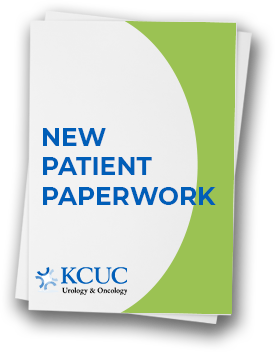Do you need a kidney stone doctor in Kansas City, Overland Park, Olathe, KS or the KC Metro? We can help and encourage you to book an appointment.
Kidney stones (calculi) are common, affecting about 2 percent of all Americans. There are many causes for urinary stones, and some are inherited (genetic). The most important factor that predisposes a person to form a kidney stone, however, is dehydration. Kidney Stones typically form when urine becomes too concentrated, causing crystals to build up inside the kidneys. Stones may be as small as a grain of sand or as large as a golf ball. We are proud to offer kidney stone treatment in Kansas City and the surrounding areas.
Many stones pass through the ureter and out of the body without the need for intervention, but if a stone is too large to pass (over 5-6mm) then it can become lodged in the ureter and cause a backing up of urine with distention of the kidney and severe colicky pain. Stones also may form silently within the urine collecting areas of the kidney and remain asymptomatic for many years. These stones when found incidentally do not always require treatment. Some however can become quite large and nearly fill the entire collecting system. These are called staghorn calculi and can slowly erode kidney function.
With over 20 experienced urologist and oncologist office locations in Kansas and Missouri, the doctors at Kansas City Urology Care proudly offer diagnosis and kidney stones treatment in Kansas City, Overland Park, Emporia, Leavenworth, Clinton, Grandview, Liberty, Olathe, Lexington, Harrisonville, Lee’s Summit, Independence, MO, and the entire KC metro area.
Risk Factors
- Male, Caucasian, age 20-60
- Dehydration (not drinking enough water)
- A diet too high in salt, calcium or oxalates (such as spinach, chocolate, nuts), excess vitamin C or D or a high protein diet
- Family history of kidney stones or a previous stone
- Metabolic diseases (such as hyperparathyroidism or gout)
- Inactive lifestyle or prolonged bed rest
- Chronic bacteria in the urine or other bladder problems
- Inflammatory bowel disease (IBD) such as Crohn’s disease
- Certain rare hereditary disorders
Symptoms of Kidney Stones
Many stones may form without symptoms until they try to pass. When they do however the following may occur.
- Sudden intense pain in your back or flank near your kidney, which may radiate towards your abdomen, groin, or genitals
- Nausea and/or vomiting
- Blood in your urine
- Frequent and painful urination
- Fever with a stone is a medical emergency and could progress to life-threatening sepsis
Diagnosis of Kidney Stones (nephrolithiasis)
In addition to taking a history and physical, your doctor may order one of the following tests to determine if and where a stone exists:
- Plain X-ray (“KUB”) of the kidneys, ureters and bladder
- CT scan without contrast (CT stone study) is the standard and best way to find a stone in the kidney or ureter
- Ultrasound – very safe but does not see ureteral stones very well
Kidney Stone Treatment in Kansas City
Many kidney stones do not require treatment and will pass on their own. The following procedures are available if your stone is trapped and will not pass on its own. Which is best for you is dependent on your general health and the size and location of the stone. Your urologist will explain the details of each and help decide which may be best for you.
- Extracorporeal Shock Wave Lithotripsy (ESWL) — sound waves pass through the body and break up the kidney stone into smaller, more easily passable fragments.
- Ureteroscopy with Lithotripsy — a very small videoscope is passed into the urinary tract, where the stone can be grasped or broken into smaller pieces with a laser.
- Percutaneous Nephrolithotomy — a video scope is placed directly into the kidney through the skin in the flank. An ultrasound or laser can then be used to break up and remove the stones. This is most effective for larger stones in the renal collection system (upper urinary tract).
- Open surgery to remove kidney stones is now a rare procedure.
Reducing Risk of Stone Recurrence
More than half of patients who develop one kidney stone will develop recurrent or additional stones. Your doctor may order special urine and blood tests to help determine risk factors or underlying conditions which may help reduce the chance of future stones. Based upon these results your doctor may suggest you:
- Drink more water
- Reduce salt and/or protein intake
- Increase dietary citrate
- Avoid foods high in oxalate
- Avoid/reduce caffeine
- Take special medications or antibiotics
Your kidney stone doctor may refer you to a nutritionist for specific dietary guidelines.
About Kansas City Urology Care (KCUC)
At KCUC, we specialize in providing supportive care that is knowledgeable, accurate, friendly and courteous. We offer state-of-the-art treatments in a modern facility, including kidney stone treatments, so you can get in and out quickly in a setting that’s relaxing and less stressful than a hospital. We also have some of the top Kansas City urologists and oncologists to help support you with multiple locations in Kansas and Missouri. Our Mission is to strive to provide the highest quality medical care in a supportive, empathetic and respectful environment.

